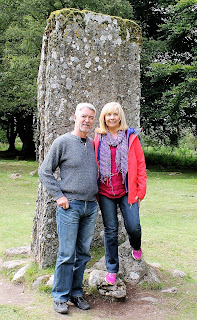Endings
 I love stories and
movies with happy endings, endings like ‘guy gets girl’ and ‘they all lived
happily ever after’. A lot of the old Westerns used to end like this, after the
climactic gunfight. Nowadays, happy endings are viewed as corny. It used to be pessimistic
Christian cults that preached a doom and gloom any minute end of the world.
However, now everyone seems to be getting in on the game, such as environmental
extremists. If we only have a few years left before the weather destroys the
planet, shouldn’t we just ‘eat, drink, and be merry’, rather than impose hardships
on ourselves? Is the world going to have a happy ending or is it all going to end
in catastrophic disaster? To the law and to the testimony!
I love stories and
movies with happy endings, endings like ‘guy gets girl’ and ‘they all lived
happily ever after’. A lot of the old Westerns used to end like this, after the
climactic gunfight. Nowadays, happy endings are viewed as corny. It used to be pessimistic
Christian cults that preached a doom and gloom any minute end of the world.
However, now everyone seems to be getting in on the game, such as environmental
extremists. If we only have a few years left before the weather destroys the
planet, shouldn’t we just ‘eat, drink, and be merry’, rather than impose hardships
on ourselves? Is the world going to have a happy ending or is it all going to end
in catastrophic disaster? To the law and to the testimony!
A favourite verse
of Christians is John 3:16, ‘For God so loved the world that He gave His only
Son, that whoever believes in Him shall not perish but have eternal life.’ Wouldn’t
it be nice if they would also memorise the very next verse where Jesus speaks
of a happy ending for the world? ‘For God did not send His Son into the world to
condemn the world, but to save the world through Him’ John 3:17.
If you were to
follow the theme that goes all through the Bible, start to finish, you’d see
that God has a people and a place for His people to live: e.g., Adam and the Garden,
Abraham and a land that God will show him, Israel and the Promised Land. Notice
what the Bible says about Abraham, ‘It was not through the law that Abraham and
his offspring received the promise that he would be heir of the world, but
through the righteousness that comes by faith’ Romans 4:13. The word for world
here is cosmos. Those who believe in the Son shall not perish. They will along with Abraham, the father of the faithful, inherit the earth. They are heirs of the world. ‘Understand,
then, that those who are of faith are children of Abraham … So those who rely
on faith are blessed along with Abraham the man of faith’ Galatians 3:7; 9. It’s
all through the Bible. Jesus says, ‘Blessed are the meek, for they will inherit
the earth’ Matthew 5:5, cf., Psalm 37:11.
Therefore, ‘the land flowing with milk and honey, the Promised Land, was only a
token of God’s Promise. ‘For no matter how many promises God has made, they are
“Yes” in Christ’ 2 Corinthians 1:20a. It’s as Matthew Henry puts it, ‘Now
Christ is the heir of the world, and it is in Him that Abraham was so.’
Therefore, the world does have a happy ending, i.e., for all those who believe
in Christ Jesus.
God the Father
promised His Son a people and place in which He and they shall live. ‘Yet I
have set My King on My holy hill of Zion. I will declare the decree: the LORD
has said to Me, “You are My Son, today I have begotten You. Ask of Me and I
will give You the nations for Your inheritance, and the ends of the earth for Your
possession … Kiss the Son, lest He be angry, and You perish in the way, when
His wrath is kindled but a little. Blessed are those who put their trust in Him’
Psalm 2:6-8; 12. The happy ending will not come till all Christ’s enemies have
been subdued. ‘Then comes the end, when He delivers the kingdom to God the
Father, when He puts an end to all rule and all authority and power. For He must
reign till He has put all enemies under His feet’ 1 Corinthians 15:24-25.
Let’s look forward
to the nations not lifting swords against each other, nor learning war anymore
(Isaiah 2:4). That’s the happy ending of the world for all who believe in
Christ.






